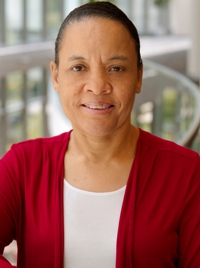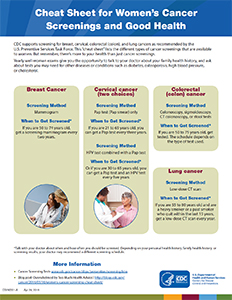Overwhelmed by Too Much Health Advice? Cheat Sheet for Women’s Cancer Screenings and Good Health
Posted on by
By Lisa C. Richardson, MD, MPH
Director of CDC’s Division of Cancer Prevention and Control
As a doctor, I am the go-to person my friends rely on when they have a medical question. A good friend recently said to me, “I’m so overwhelmed by all of the health advice out there that I tend to just tune it all out.” She went on to say that every time she turns around, she hears something else that women should do to stay healthy: get a mammogram, get your Pap smear, get a colonoscopy, don’t smoke, exercise, get more sleep, get a flu shot, eat more kale, get a whooping cough vaccine (pertussis booster vaccine)…and I think you get her point. I certainly did.
This got me thinking. As a woman, an oncologist, and the director of CDC’s Division of Cancer Prevention and Control, I can help. I don’t want you ignoring anything that may help you stay healthy…and alive! To help lighten the load, I’ve created your very own cheat sheet for cancer screenings and good health. CDC supports screening for breast, cervical, colorectal (colon), and lung cancers as recommended by the U.S. Preventive Services Task Force.
I’ve started your cheat sheet off with the screenings (checking your body for a disease before you have symptoms) that are available for some of the cancers that most often affect women. But I challenge you to add to it with your doctor’s recommendations for further screenings or tests based on your own health, family history, and age. Download this printable fact sheet [PDF-106B] to take to your next appointment.
Your Cheat Sheet to Cancer Screenings and Good Health
| Type of Cancer | Screening Method | When to Get Screened* |
|---|---|---|
| Breast cancer | Mammogram | If you are 50 to 74 years old, get a screening mammogram every two years. |
| Cervical cancer (two choices) | Pap test (Pap smear) only | If you are 21 to 65 years old, you can get a Pap test every three years. |
| HPV test (combined with Pap test) | Or if you are 30 to 65 years old, you can get a Pap test and an HPV test every five years. | |
| Colorectal (colon) cancer | Colonoscopy, sigmoidoscopy, or fecal occult blood testing (FOBT) | If you are 50 to 75 years old, get tested. The schedule depends on the type of test used. |
| Lung cancer | Low-dose CT scan | If you are 55 to 80 years old and are a heavy smoker or a past smoker who quit within the last 15 years, get a low-dose CT scan every year. |
*Talk with your doctor about when and how often you should be screened. Depending on your personal health history, family health history, or screening results, your doctor may recommend a different screening schedule.

And like any good doctor, I want to remind you of some simple things you can do every day to stay healthy:
- Maintain a healthy weight.
- Exercise regularly.
- Get plenty of rest.
- Don’t drink alcohol, or limit it to one drink a day.
- Don’t smoke.
As I get older and watch my family and friends age beside me, I see how important good health is. It sounds so easy, right? But as a working mom, wife, and daughter, I know how many different directions you are pulled in every day. But remember, the best gift you can give the people who care about you is a healthy you.
Put YOU at the top of your to-do list today so that you can give yourself the best chance of preventing or overcoming something that doesn’t have to overcome YOU.
Lastly, to all of you fighting cancer or caring for someone who is fighting this battle, I encourage you to take steps to stay as healthy as you can during treatment. For more information, visit CDC’s Preventing Infections in Cancer Patients website for staying healthy during cancer treatment and 3 Steps Toward Preventing Infections During Cancer Treatment from the CDC Foundation.
Posted on by

